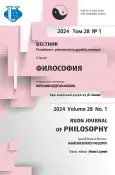Проблематика свободы воли и моральной ответственности в этике буддизма
- Авторы: Волкова В.А.1
-
Учреждения:
- Московский государственный университет имени М.В. Ломоносова
- Выпуск: Том 28, № 1 (2024): ФИЛОСОФИЯ БУДДИЗМА МАХАЯНЫ
- Страницы: 109-119
- Раздел: ФИЛОСОФИЯ БУДДИЗМА МАХАЯНЫ
- URL: https://journal-vniispk.ru/2313-2302/article/view/325449
- DOI: https://doi.org/10.22363/2313-2302-2024-28-1-109-119
- EDN: https://elibrary.ru/APQIBK
- ID: 325449
Цитировать
Полный текст
Аннотация
В конце XX в. в англоязычных странах происходит формирование дисциплины буддийских этических исследований (Buddhist ethics), в рамках которой сообщество тесно взаимодействующих друг с другом исследователей занимается осмыслением и систематизацией этических положений буддизма, зачастую прибегая к использованию инструментария аналитической философии. Одно из направлений дисциплины Buddhist ethics представляет собой попытку встроить этическое содержание буддизма в современный западноевропейский философский контекст и поставить перед ним вопросы, характерные для западной философии, например, вопрос о моральной ответственности, свободе воли и детерминизме. В то время, как одни исследователи считают, что буддийские тексты отражают компатибилистскую позицию, другие видят в буддийских этических положениях указание на инкомпатибилизм. Первая проблема, с которой сталкиваются исследователи буддизма, заинтересованные в этой теме, состоит в том, что в буддизме нет представления о «свободе воли» в том виде, в каком оно существует в западной философии. Тем не менее, современные теоретики считают, что классический буддизм содержит достаточно материала, позволяющего вести разговор о каузальности и ответственности. Цель данного исследования - обосновать возможность обсуждения свободы воли в этике буддизма. Для этого в работе рассматриваются ключевые положения буддийского учения, релевантные в контексте свободы воли: зависимое возникновение, отсутствие самости и карма. Отмечается, что одним из оснований различия выводов исследователей буддийской этики в отношении вопроса о свободе воли и моральной ответственности в буддизме являются различия между тхеравадой и махаяной и то, к текстам какой традиции тот или иной теоретик преимущественно обращается.
Ключевые слова
Об авторах
Влада Алексеевна Волкова
Московский государственный университет имени М.В. Ломоносова
Автор, ответственный за переписку.
Email: aleksa-vlada@yandex.ru
ORCID iD: 0000-0001-7840-6842
аспирантка, кафедра истории зарубежной философии, философский факультет
Российская Федерация, 119991, Москва, Ломоносовский пр., д. 27, к. 4Список литературы
- Loginov EV, Gavrilov MV, Mertsalov AV, Iunusov AT. Prolegomena to moral responsibility. Date Palm Compote. 2020;(15):3-100. (In Russian). https://doi.org/i0.244la/a587-g308-2020-i5-3-i00
- Loginov EV, Gavrilov MV, Mertsalov AV, Iunusov AT. Ethics and Metaphysics of Moral Responsibility. Ethical Thought. 2021;21(2):5-17. (In Russian). https://doi.org/10.21146/2074-4870-2021-21-2-5-17
- Volkova V. The Rise of Buddhist Ethical Studies in English-speaking Countries. Ethical Thought. 2023;23(1):82-94. (In Russian). https://doi.org/10.21146/2074-4870-2023-23-1-82-94
- Garfield J. Just another word for ‘nothing left to lose’: Freedom, Agency, and Ethics for Mādhyamikas. In: Buddhist perspectives on free will: agentless agency? Repetti R, editor. N.Y.: Routledge; 2017. P. 45-58.
- Flanagan O. Negative dialectics in comparative philosophy: The case of Buddhist free will quietism. In: Buddhist Perspectives on Free Will: Agentless Agency? Repetti R, editor. N.Y.: Routledge; 2017. P. 59-71.
- Lysenko VG. Karma. In: Buddhist Philosophy: Encyclopedia. Stepanyants MT, editor. Moscow: Eastern Literature Publishing Company of Russian Academy of Sciences; 2011. P. 360-369. (In Russian).
- Repetti R. Earlier buddhist theories of free will: compatibilism. Journal of Buddhist Ethics. 2010;(17):279-311.
- Repetti R. Buddhist Reductionism and Free Will: Paleo-compatibilism. Journal of Buddhist Ethics. 2012;(19):33-95.
- Repetti R. Buddhist hard determinism: no self, no free will, no responsibility. Journal of Buddhist Ethics. 2012;(19):130-166.
- Repetti R. Recent Buddhist theories of free will: compatibilism, incompatibilism, and beyond. Journal of Buddhist Ethics. 2014;(21):316-353.
- Story F. Dimensions of Buddhist Thought: Essays and Dialogues. Kandy, Sri Lanka: Buddhist Publication Society; 1976.
- Rāhula W. What the Buddha taught. New York: Grove Press; 1974.
- Gómez LO. Some aspects of the free-will question in the Nikāyas. Philosophy East and West. 1975;25(1):81-90.
- Kalupahana DJ. Buddhist Philosophy: A Historical Analysis. Honolulu, Hawaii: University of Hawaii Press; 1976.
- Siderits M. Beyond compatibilism: a Buddhist approach to freedom and determinism. American Philosophical Quarterly. 1987;24(2):149-159.
- Goodman C. Resentment and reality: Buddhism on moral responsibility. American Philosophical Quarterly. 2002;39(4):359-372.
- Gier NF, et al. Buddhism and the Freedom of the Will: Pali and Mahayanist Responses. In: Freedom and determinism: Topics in Contemporary Philosophy. Campbell JK, Shier D, O’Rourke M, editors. MIT Press; 2004. P. 277-304.
- Federman A. What kind of free will did the Buddha teach? Philosophy East and West. 2010;60(1):1-19.
- Harvey P. “Freedom of the Will” in the light of Theravada Buddhist teachings. Journal of Buddhist Ethics. 2007;(14):35-100.
- Bernier P. Causation and Free Will in Early Buddhist Philosophy. Buddhist Studies Review. 2020;36(2):191-220.
- Androsov V, editor. Dīgha Nikāya (Collection of Long Discourses). Syrkin A, transl. Moscow: Nauka - Vostochnaya Literatura publ.; 2020. (In Russian).
- Repetti R. Agentless Agency: The Soft Compatibilist Argument from Buddhist Meditation, Mind-mastery, Evitabilism and Mental Freedom. In: Buddhist perspectives on free will: agentless agency? Repetti R, editor. N.Y.: Routledge; 2017. P. 193-206.
- Friquegnon M. Free Will, Liberation, and Buddhist Philosophy. In: Buddhist perspectives on free will: agentless agency? Repetti R, editor. N.Y.: Routledge; 2017. P. 106-112.
- Adam MT. No self, no free will, no problem: Implications of the Anattalakkhaṇa Sutta for a perennial philosophical issue. Journal of the International Association of Buddhist Studies. 2010-2011;33(1-2):239-265.
- Keown D. The Nature of Buddhist Ethics. N.Y.: Palgrave; 2001.
- Goodman C. Consequences of compassion: an interpretation and defense of Buddhist ethics. N.Y.: Oxford University Press; 2009.
- Garfield J. What Is It Like To Be a Bodhisattva? Moral Phenomenology in Śāntideva’s Bodhicāryāvatāra. Journal of the International Association of Buddhist Studies. 2010;33(1-2):327-351.
- Volkova V. Buddhist ethics in the context of western normative ethical theories: virtue ethics. Philosophy and Society. 2023;(3):102-117. (In Russian). https://doi.org/10.30884/jfio/2023.03.06
- Finnigan B. Karma, moral responsibility, and Buddhist ethics. In: The Oxford Handbook of Moral Psychology. Oxford: OUP. 2022. P. 7-23.
- Katz N. Note: Dependent Origination, Free Will, and Moral Responsibility. Namgyal Institute of Tibetology, Gangtok, Sikkim; 1974. P. 24-26.
- Repetti R, editor. Buddhist Perspectives on Free Will: Agentless Agency? New York: Routledge; 2016.
Дополнительные файлы









